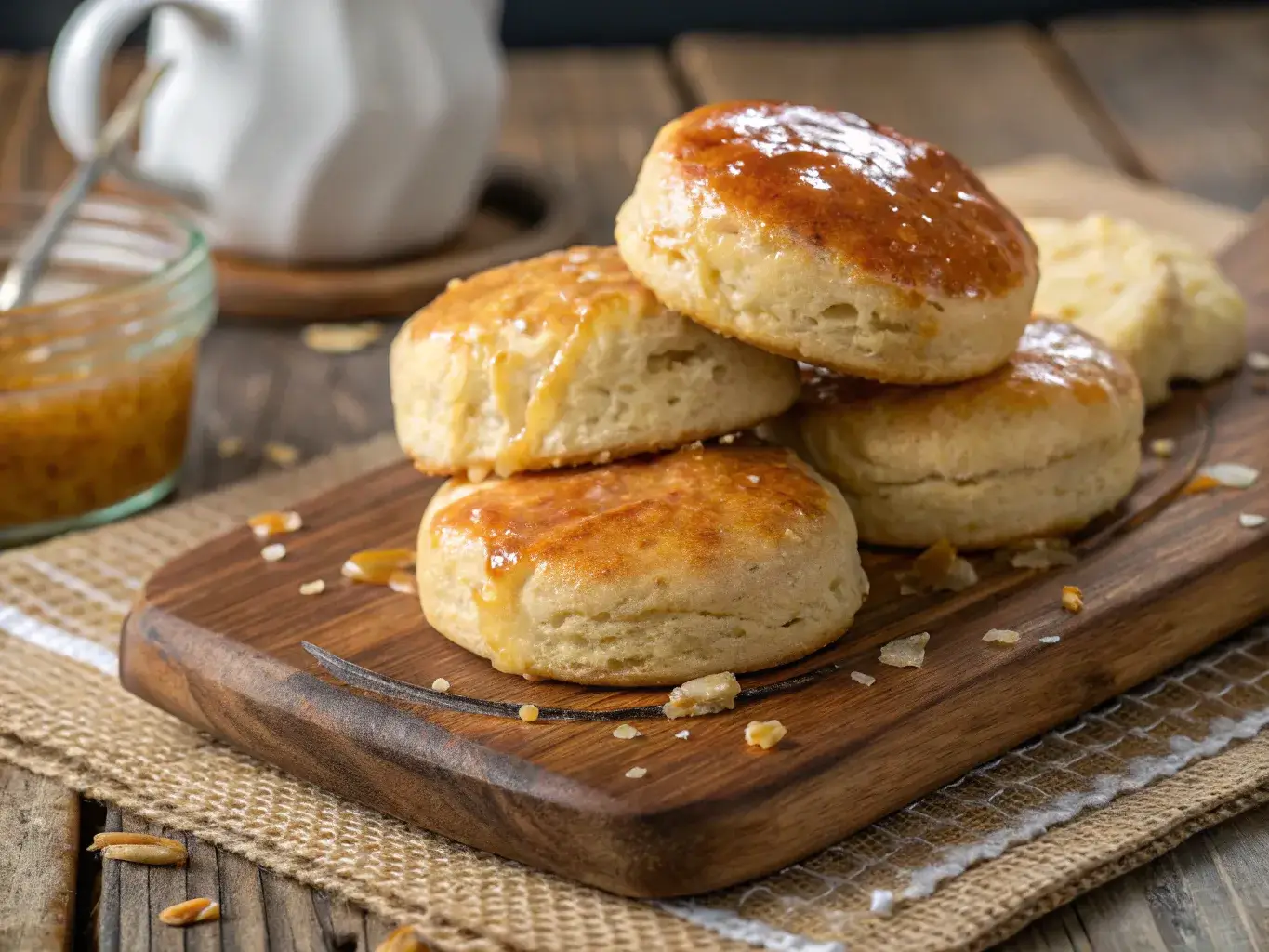Maque-style Mexican biscuits, known as bisquets, are a beloved part of Mexican breakfasts, and here at Recipes of Kitchen, The Gluten-Free Sweet Kitchen, I’m excited to share them with you. My journey into gluten-free baking began when I discovered my gluten sensitivity. Instead of giving up the baked goods I loved, I learned to recreate them with gluten-free ingredients, including classics like bisquets.
In this guide, we’ll uncover what makes Mexican bisquets unique, how they differ from American biscuits, and the many ways to enjoy them, with tips for making them gluten-free at home.
Introduction to Maque-Style Mexican Biscuits
The Cultural Roots of Mexican Bisquets
Mexican bisquets trace their origins to the fusion of European baking traditions with local Mexican flavors during the colonial era. While inspired by European breads, bisquets developed their own identity with a tender, slightly sweet taste and a light, fluffy crumb. Over time, they became a favorite in Mexican breakfast culture, especially paired with coffee or hot chocolate.
These biscuits are more than food, they’re part of Mexico’s culinary heritage. Panaderías (bakeries) across the country serve them daily, and many families still enjoy them fresh from the oven with butter, jam, or savory fillings.
Why They Are Different from American Biscuits
If you’ve ever wondered how Mexican bisquets compare to American biscuits, the answer lies in both the ingredients and the texture. American biscuits are typically flaky, buttery, and often savory. In contrast, Mexican bisquets are enriched with milk and a touch of sugar, giving them a softer, richer, and slightly sweet flavor.
The preparation also differs. While American biscuits use a quick dough technique to achieve flakiness, Mexican bisquets are kneaded longer to create a light, fluffy texture similar to brioche but less sweet.
Print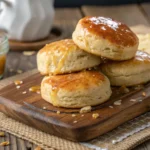
Maque-Style Mexican Biscuits: A Complete Guide to Bisquets
- Total Time: 30 minutes
- Yield: 10 biscuits 1x
- Diet: Vegetarian
Description
Fluffy, tender Mexican-style biscuits made with cornmeal for a rustic flavor, perfect with honey, butter, or savory fillings.
Ingredients
- 1 cup all-purpose flour
- 1 cup finely ground cornmeal (maíz)
- 2 tsp baking powder
- 1/2 tsp baking soda
- 1/2 tsp salt
- 2 tbsp sugar (optional, for a touch of sweetness)
- 1/4 cup unsalted butter, cold and cubed
- 3/4 cup buttermilk (or whole milk with 1 tsp vinegar)
- 1 large egg, lightly beaten
- Optional: 1/4 cup shredded cheese (like cotija or cheddar)
- Optional: 1 tbsp chopped fresh cilantro
Instructions
- 1. Preheat oven to 425°F (220°C). Line a baking sheet with parchment paper.
- 2. In a large bowl, whisk together the flour, cornmeal, baking powder, baking soda, salt, and sugar.
- 3. Cut the cold butter into the dry ingredients using a pastry cutter or your fingers until the mixture resembles coarse crumbs.
- 4. Stir in the buttermilk and beaten egg until just combined. Do not overmix.
- 5. If desired, fold in shredded cheese or cilantro for extra flavor.
- 6. Turn the dough out onto a floured surface and gently pat into a 1-inch-thick round.
- 7. Use a biscuit cutter or glass to cut out biscuits and place them on the prepared baking sheet.
- 8. Bake for 12–15 minutes, or until golden brown on top.
- 9. Serve warm with butter, honey, or a savory topping.
Notes
- For a more authentic Mexican touch, use masa harina instead of cornmeal.
- These biscuits pair beautifully with chili, soups, or alongside breakfast dishes.
- You can freeze unbaked biscuits on a tray, then store in a freezer bag. Bake directly from frozen, adding 2–3 extra minutes.
- Prep Time: 15 minutes
- Cook Time: 15 minutes
- Category: Bread
- Method: Baking
- Cuisine: Mexican
Nutrition
- Serving Size: 1 biscuit
- Calories: 150
- Sugar: 3g
- Sodium: 220mg
- Fat: 6g
- Saturated Fat: 3.5g
- Unsaturated Fat: 2.5g
- Trans Fat: 0g
- Carbohydrates: 22g
- Fiber: 2g
- Protein: 4g
- Cholesterol: 25mg
Keywords: biscuits, Mexican, cornmeal, maque-style
Mexican Bisquets vs American Biscuits
| Feature | Maque-Style Mexican Biscuits (Bisquets) | American Biscuits |
|---|---|---|
| Flavor | Slightly sweet, milky, soft | Savory, buttery, flaky |
| Texture | Light, fluffy, airy | Crumbly, layered |
| Key Ingredients | Milk, sugar, flour, sometimes yeast | Flour, butter, baking powder |
| Common Pairings | Café de olla, jam, cajeta, ham & cheese | Gravy, butter, fried chicken |
| Cultural Role | Breakfast and snack staple in Mexico | Southern comfort food in the USA |
What Are Maque-Style Mexican Biscuits?
Traditional Ingredients and Preparation
- Flour Base
Maque-style Mexican biscuits are traditionally made with all-purpose flour, though many home bakers now experiment with gluten-free flour blends. - Enriched Dough
Unlike American biscuits, maque-style Mexican biscuits use milk, butter, and a touch of sugar to create a richer, softer crumb. - Kneading Technique
The dough is kneaded more thoroughly than American biscuits, which gives bisquets their fluffy, bread-like texture. - Baking Method
They are baked until golden brown, often brushed with butter for a shiny, appetizing crust.
The Texture and Flavor Profile
- Soft and Fluffy
The hallmark of maque-style Mexican biscuits is their pillow-like softness, perfect for pairing with both sweet and savory toppings. - Mild Sweetness
A subtle sweetness sets them apart, making them versatile for breakfast, snacks, or even light dinners. - Versatility
They can be enjoyed plain, with butter and jam, or filled with savory ingredients like ham and cheese. - Distinct Aroma
Thanks to the milk and butter in the recipe, maque-style Mexican biscuits have a warm, comforting aroma that fills any kitchen.
Key Traits of Maque-Style Mexican Biscuits
| Aspect | Maque-Style Mexican Biscuits Characteristics |
|---|---|
| Base Ingredients | Flour, milk, butter, sugar |
| Texture | Soft, fluffy, and airy |
| Flavor | Slightly sweet with a creamy, milky note |
| Versatility | Delicious with both sweet and savory toppings |
| Common Uses | Perfect for breakfast, merienda (afternoon snack), or paired with coffee |
If you’ve been wondering what makes maque-style Mexican biscuits so unique, it’s their blend of simple ingredients and traditional techniques that create a bread unlike any other.
How Are Mexican Bisquets Different from American Biscuits?
Baking Method Comparison
- Maque-style Mexican biscuits are made with an enriched dough that includes milk, butter, and a touch of sugar, giving them a soft, airy crumb.
- American biscuits typically use buttermilk or cream and rely on minimal kneading for a crumbly, flaky texture.
- The dough for maque-style Mexican biscuits is kneaded more thoroughly, which develops structure and results in a pillowy texture.
- American biscuits use a quick-dough method, often taking less time to prepare but creating a denser, layered feel.
Ingredient and Flavor Differences
- Flavor Profile
- Maque-style Mexican biscuits have a gentle sweetness and a creamy, milky richness that makes them irresistible.
- American biscuits are usually savory, with buttery, salty notes.
- Toppings and Pairings
- Bisquets are commonly paired with café de olla, jam, cajeta, or even savory fillings like ham and cheese.
- American biscuits are most often served with gravy, butter, or fried chicken.
- Cultural Role
- Maque-style Mexican biscuits are a daily breakfast staple in Mexican panaderías and homes.
- American biscuits are iconic in Southern cuisine and often part of hearty comfort meals.
Comparing Maque-Style Mexican Biscuits and American Biscuits
| Feature | Maque-Style Mexican Biscuits (Bisquets) | American Biscuits |
|---|---|---|
| Dough Type | Enriched with milk, butter, sugar | Buttermilk/cream, butter |
| Texture | Soft, airy, pillowy | Crumbly, flaky, layered |
| Flavor | Mildly sweet, milky | Savory, buttery, salty |
| Common Pairings | Café de olla, jam, cajeta, ham, cheese | Gravy, butter, fried chicken |
| Cultural Significance | Mexican breakfast and snack staple | Southern comfort food tradition |
Popular Ways to Enjoy Mexican Bisquets
Common Toppings
- Butter and Jam
A timeless choice, spreading butter and fruit jam on warm maque-style Mexican biscuits highlights their mild sweetness. - Cajeta (Goat’s Milk Caramel)
A Mexican favorite, cajeta adds a rich caramel flavor that pairs perfectly with the soft, milky crumb of bisquets. - Sweetened Cream or Condensed Milk
For those who enjoy extra indulgence, cream or condensed milk turns bisquets into a dessert-like treat.
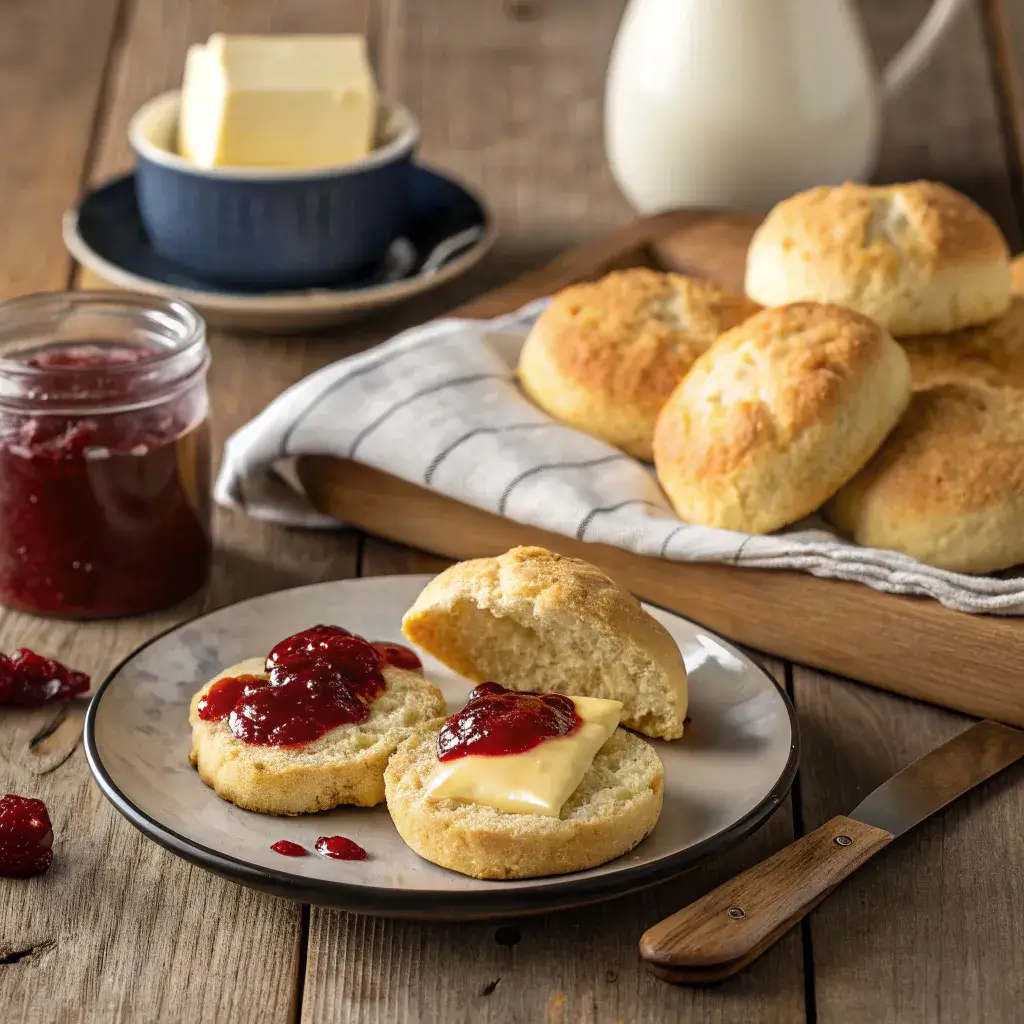
Savory Fillings
- Ham and Cheese
One of the most popular savory combinations, especially for breakfast or a light dinner. - Refried Beans
Adds protein and makes the bisquets more filling, often served with fresh salsa. - Eggs and Avocado
A modern twist, perfect for a nutritious start to the day.
Sweet vs Savory Pairings for Maque-Style Mexican Biscuits
| Style | Topping or Filling | Flavor Profile | When to Enjoy |
|---|---|---|---|
| Sweet | Butter and fruit jam | Light, fruity, slightly tangy | Breakfast or merienda |
| Sweet | Cajeta (goat’s milk caramel) | Rich, caramelized sweetness | Afternoon snack or dessert |
| Sweet | Sweet cream or condensed milk | Creamy, indulgent | Special occasions |
| Savory | Ham and cheese | Salty, hearty, satisfying | Classic Mexican breakfast |
| Savory | Refried beans | Savory, earthy, protein-rich | Mid-morning or light dinner |
| Savory | Eggs and avocado | Nutritious, modern twist | Healthy breakfast option |
Why This Variety Matters
The beauty of maque-style Mexican biscuits is their versatility. They can easily shift from sweet to savory, making them suitable for any time of the day. Whether you enjoy them with jam in the morning or stuffed with ham and cheese for a quick meal, bisquets bring both tradition and flexibility to the table.
The Role of Bisquets in Mexican Breakfast Culture
Café de Olla and Bisquets Pairing
- Classic Combination
Maque-style Mexican biscuits are most often enjoyed with café de olla, a traditional Mexican coffee brewed with cinnamon and piloncillo (unrefined cane sugar). - Perfect Balance
The mild sweetness of bisquets pairs beautifully with the spiced richness of café de olla, creating a breakfast experience that is both comforting and energizing. - Cultural Tradition
This pairing is deeply rooted in Mexican breakfast culture, symbolizing warmth and togetherness.
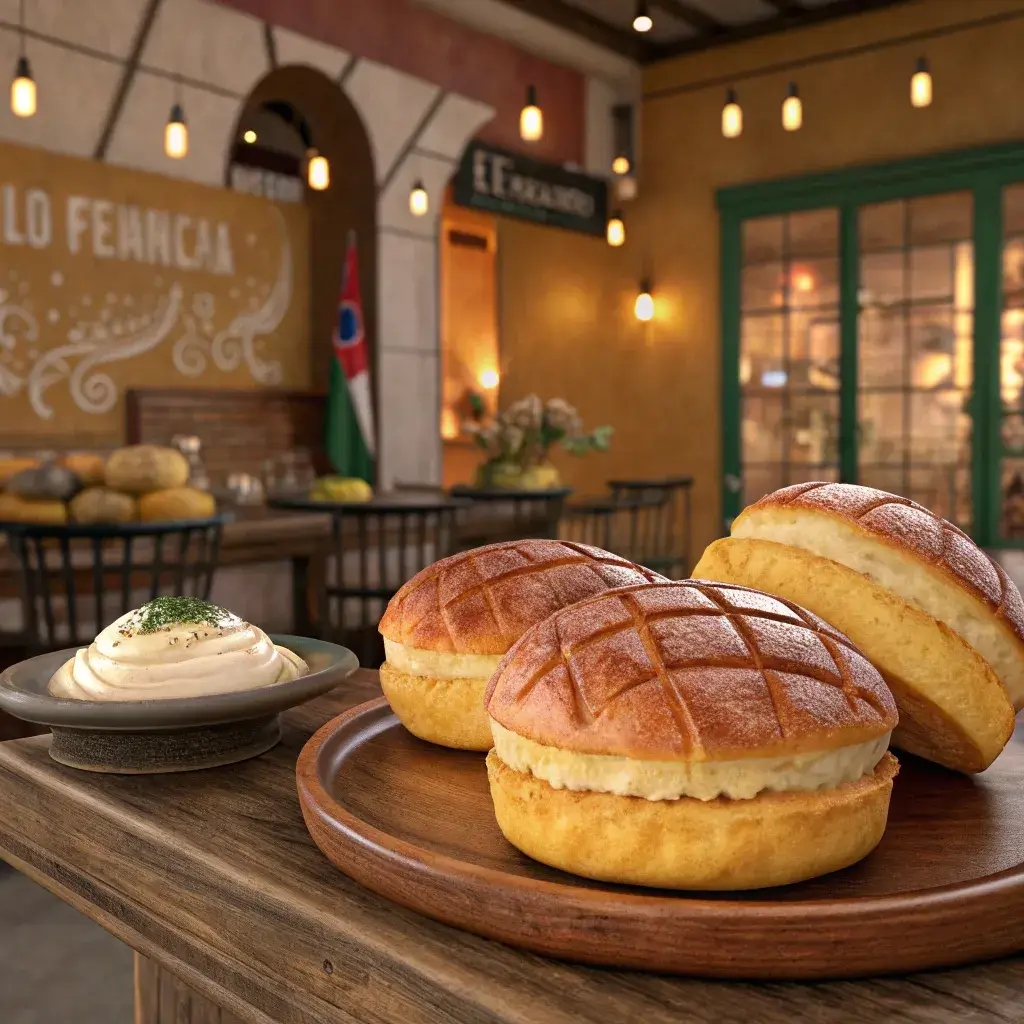
Street Vendors vs Traditional Panaderías
- Panaderías (Bakeries)
Traditional panaderías prepare fresh bisquets daily, often serving them warm with butter or jam. - Street Vendors
In many towns, street vendors sell bisquets early in the morning, usually accompanied by coffee or atole (a warm corn-based drink). - Homemade Touch
Many families bake their own bisquets on weekends, turning breakfast into a cherished family ritual.
Where and How Bisquets Are Enjoyed
| Setting | Typical Pairing | Cultural Significance |
|---|---|---|
| Panaderías | Warm bisquets with butter or jam | A daily staple for locals |
| Street Vendors | Bisquets with café de olla or atole | Affordable, quick breakfast on the go |
| Home Kitchens | Freshly baked bisquets with fillings | Family bonding and weekend traditions |
Why Bisquets Matter in Breakfast Culture
Maque-style Mexican biscuits are more than just food; they are a symbol of hospitality and tradition. Whether bought from a panadería, enjoyed from a street vendor, or baked at home, bisquets remain a beloved part of Mexican mornings.
Homemade Maque-Style Mexican Bisquets
Step-by-Step Recipe Guide
- Ingredients Needed
- 2 cups flour (or gluten-free flour blend)
- 1 tsp baking powder
- ½ tsp salt
- 3 tbsp sugar
- ½ cup butter, softened
- ¾ cup milk
- 1 egg for brushing
- Instructions
- Preheat oven to 375°F (190°C).
- In a large bowl, whisk together the flour, baking powder, salt, and sugar until well combined.
- Cut in butter until mixture resembles coarse crumbs.
- Add milk and knead until a soft dough forms.
- Roll out dough and cut into rounds.
- Place on a greased baking sheet, brush with egg wash.
- Bake for 15–18 minutes until golden brown.
Tips for Authentic Flavor and Texture
- Use whole milk for a richer crumb.
- Brush tops with butter right after baking for a glossy finish.
- For gluten-free versions, combine rice flour, sorghum flour, and tapioca starch.
- Extend kneading slightly for a fluffier texture.
Demonstration Table: Key Adjustments for Gluten-Free Bisquets
| Adjustment | Why It Matters | Result |
|---|---|---|
| Rice Flour Blend | Provides lightness | Keeps biscuits airy |
| Sorghum Flour | Adds flavor similar to wheat | Authentic taste |
| Tapioca Starch | Improves elasticity and structure | Prevents crumbling |
| Extra Kneading | Builds structure without gluten | Fluffy, soft texture |
Nutritional Value and Health Considerations
Calories, Carbs, and Portion Sizes
- A traditional serving of maque-style Mexican biscuits contains about 180–220 calories.
- Carbohydrates are the primary energy source, usually 30–35 grams per serving.
- They also provide a moderate amount of protein and fats from milk and butter.
Gluten-Free and Healthier Adaptations
- Gluten-Free Flours
Substituting wheat flour with certified gluten-free blends makes them safe for gluten-sensitive diets. - Reduced Sugar
Lowering sugar content keeps them lighter and healthier without losing flavor. - Alternative Milks
Almond or oat milk can replace dairy milk for lactose-free versions. - Added Fiber
Incorporating flaxseed or chia can boost nutritional value.
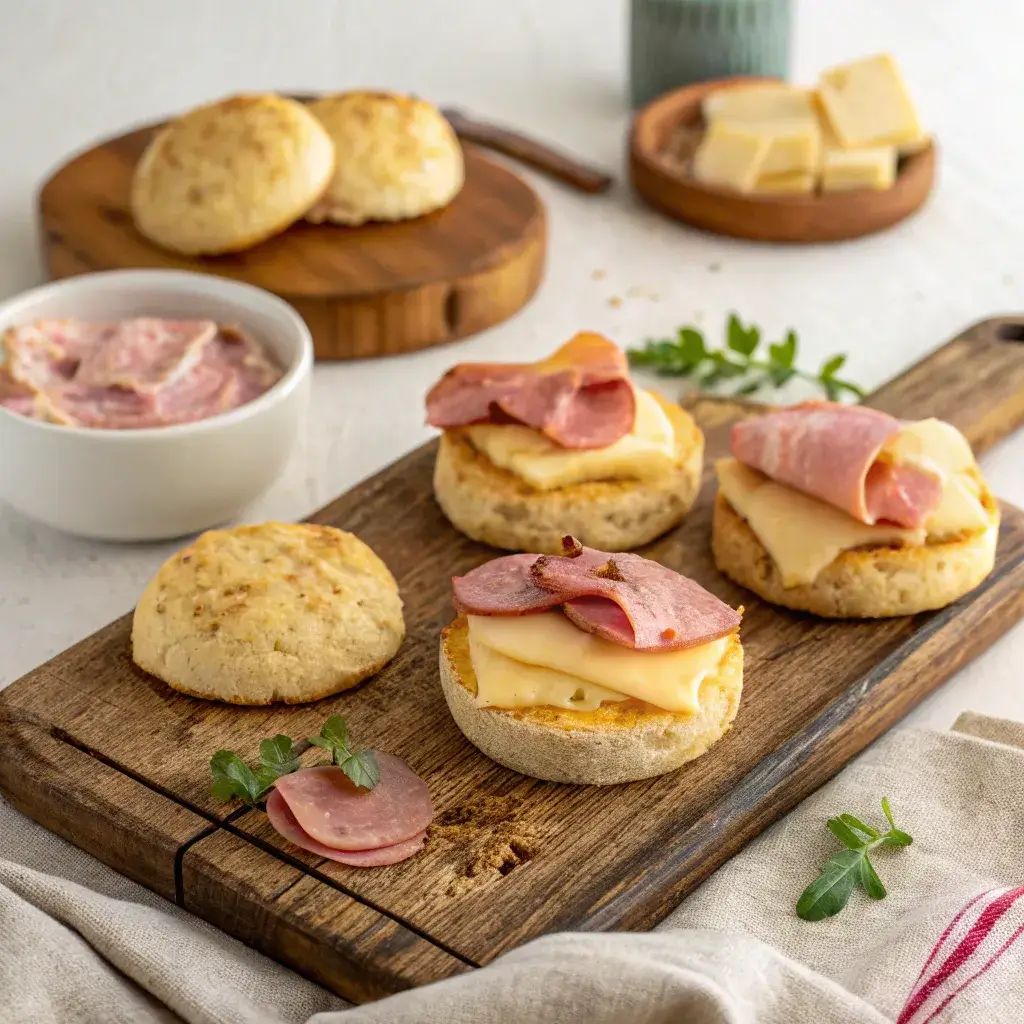
Nutritional Comparison
| Version of Bisquets | Calories | Carbs (g) | Fat (g) | Protein (g) | Gluten-Free Safe |
|---|---|---|---|---|---|
| Traditional Bisquets | 200 | 34 | 8 | 5 | No |
| Gluten-Free Bisquets | 190 | 32 | 7 | 5 | Yes |
| Reduced Sugar Version | 170 | 28 | 7 | 5 | Yes |
| Added Fiber Version | 180 | 30 | 7 | 6 | Yes |
Variations Across Mexico
Northern vs Central Mexican Bisquets
- Northern Mexico
Bisquets tend to be larger and slightly less sweet, often eaten with savory fillings like ham and cheese. - Central Mexico
Sweeter versions are more common, usually paired with café de olla or hot chocolate.
Modern Bakery Twists
- Stuffed Bisquets
Some bakeries now offer bisquets filled with chocolate, fruit, or cream for a dessert-like treat. - Health-Conscious Versions
Gluten-free, vegan, and whole-grain bisquets are gaining popularity in urban panaderías. - Mini Bisquets
Bite-sized versions are trendy for parties and special occasions.
Demonstration Table: Regional and Modern Variations
| Variation Type | Characteristics | Popular Pairings |
|---|---|---|
| Northern Bisquets | Larger, less sweet, hearty | Ham, cheese, savory spreads |
| Central Bisquets | Sweeter, smaller, lighter | Café de olla, hot chocolate |
| Stuffed Bisquets | Filled with cream, chocolate, or fruit | Dessert or afternoon snack |
| Health-Conscious | Gluten-free, vegan, or whole-grain | Almond milk, herbal teas |
| Mini Bisquets | Bite-sized, trendy for events | Sweet or savory spreads |
FAQs About Maque-Style Mexican Biscuits
How are Mexican bisquets different from American biscuits?
Maque-style Mexican biscuits are known for being soft, fluffy, and slightly sweet, while American biscuits lean more toward flaky and savory. The enriched dough of bisquets, made with milk and a touch of sugar, sets them apart.
Are Mexican bisquets eaten with toppings or fillings?
Yes. Maque-style Mexican biscuits are enjoyed both ways. Sweet toppings like cajeta or jam are popular, while savory fillings such as ham, cheese, or refried beans make them hearty meals.
Can bisquets be made gluten-free?
Absolutely. By substituting wheat flour with a blend of rice, sorghum, and tapioca flours, you can bake gluten-free maque-style Mexican biscuits that taste just as authentic.
Do bisquets taste sweet or savory?
Traditionally, they lean toward a mild sweetness, but their neutral flavor allows them to pair equally well with savory options.
What drinks pair best with bisquets?
Classic pairings include café de olla, hot chocolate, or atole. Their soft crumb soaks up warm drinks beautifully.
Conclusion
Maque-style Mexican biscuits are more than just breakfast bread they are a symbol of warmth, tradition, and versatility in Mexican cuisine. Softer and slightly sweeter than American biscuits, they can be enjoyed with sweet toppings like cajeta or savory fillings such as ham and cheese. While traditional bisquets are made with wheat flour, gluten-free adaptations make it possible for everyone to enjoy them without missing out on authentic flavor.

